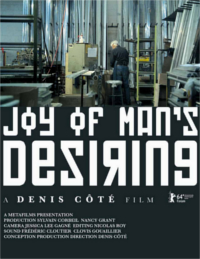All Work and No Play Makes Côté Toy With Factory Observation
 After a sultry opening monologue from a mystery woman that resonates with a statement that ‘Everything has a price. Not always money’, Denis Côté’s latest erupts in an anxiety inducing symphony of rhythmic industrialization, the pounding and clanging increasing in both proximity and volume as the camera slowly dollies in on a montage of machinery in operation. It is this harsh repetitiveness of mechanization and it’s mixed relationship with the people that engage with it that Joy of Man’s Desiring manages to encapsulate, the human cost of mass consumer factory production.
After a sultry opening monologue from a mystery woman that resonates with a statement that ‘Everything has a price. Not always money’, Denis Côté’s latest erupts in an anxiety inducing symphony of rhythmic industrialization, the pounding and clanging increasing in both proximity and volume as the camera slowly dollies in on a montage of machinery in operation. It is this harsh repetitiveness of mechanization and it’s mixed relationship with the people that engage with it that Joy of Man’s Desiring manages to encapsulate, the human cost of mass consumer factory production.
Excluding the various to-camera portrait shots and lyrical anecdotes that are increasingly sprinkled throughout, much of the film feels akin to the output of the rising stars of Harvard’s Sensory Ethnology Lab. Mixing its focus of physical labor a-la Leviathan with the stringent observation of Manakamana and Sweetgrass, the film bathes the viewer in an aural wash of factory noise and casual on-duty conversation between various anonymous workers, but ultimately loses it’s authenticity by interjecting a playfully flaccid fictional coda that toys with the ‘need but don’t want’ relation most people have with their jobs. Breaking the spellbinding naturalistic tone, Côté drops a faux depressed laborer wanting out into the mix, while a woman on hand is more than willing to take his job.
Superfluous as the epilogue is, it makes its point. The majority of the workers found on screen look nothing short of bored and miserable, performing the same monotonous task over and over, followed by a break where they often sit and stare off in silence. Their glazed over gazes seem to be asking us to fill their heads with fantastical stories that take place anywhere but beside their assigned machine, and yet many vocally appreciate their mechanical jobs, knowing full well someone out there would be more than willing to replace them. They’ve found an enjoyable rhythm about their given tasks, and their lives outside of work are better for it. It is this delicate balance that Côté seems to be interested in, the relationship between man and machine that was birthed during the industrial revolution and as only become more widespread since. No matter how tedious the task, one must find some satisfaction in their jobs in order to maintain a sort of sanity amongst their co-workers.
As if part of the menagerie of caged animals of Bestiaire, Côté’s factory workers share a variety of gloomy, unadorned warehouse spaces, all dressed uniformly, each evoking the bitter-sweet conundrum of our blue collar lineage with only their devout physical presence and a blatant apathy about it all that repeatedly surfaces in observational portraiture and casual conversation alike. The gorgeous static framing and the overbearing aural violence of machinery running full-bore on the soundtrack flexes oppositionally with the ideas of humans being denigrated by their repetitive tasks while they literally dominate over their assigned equipment to better the lives of consumers outside of the factories’ walls. Occasionally, Côté overworks the subtle complexities of Joy of Man’s Desiring by unnecessarily adding stylized fictional passages, but when sticking to a straightforward meditation of humanity’s multifarious relationship with their life-sustaining work, there is much in the way of sapient sensorial indulgence to savor.
★★★/☆☆☆☆☆
Reviewed on April 26th, 2014 at the 2014 Hot Docs Film Festival – Canadian Spectrum Program – 70 mins.


